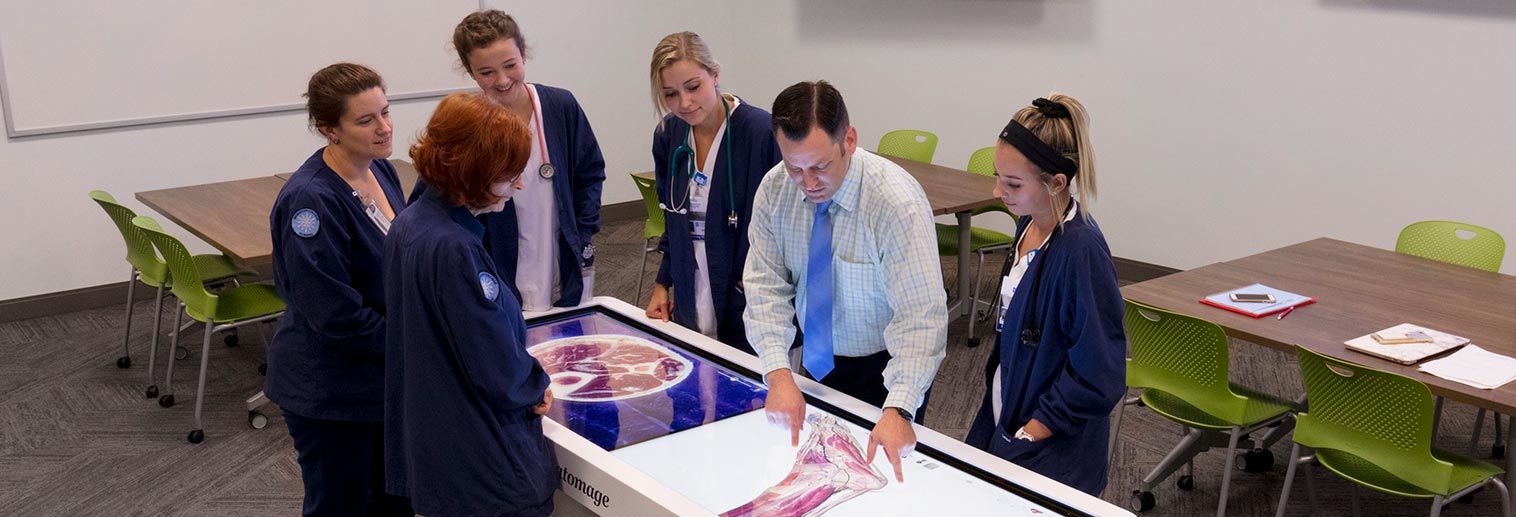Master of Science in Nursing Program Outcomes
Upon successful completion of the program of study, it is expected that the graduate will:
- Synthesize new and prior learning for clinical decision-making, policy development, and healthcare leadership.
- Analyze population health perspectives in provision of safe, person-centered care to foster optimal health outcomes and well-being for diverse individuals, families, communities, and populations.
- Conduct scholarly inquiry using information technology to synthesize best evidence to inform nursing practice, education, research, and policy.
- Perform quality improvement initiatives that ensure cost-effective health care, promoting a culture of safety at the individual and systems levels.
- Refine one’s own professional identity through adherence to professional standards of practice and code of ethics.
- Create a culture of collaboration across disciplines through transformational leadership.
Adult Gerontology Acute Care Nurse Practitioner Program Outcomes
Upon successful completion of the program of study the AG-AC NP Program graduate is prepared to:
- Use evidence-based interdisciplinary best practices for acute care when assessing, diagnosing, and treating patients, including young adults, adults and old adults.
- Meet the diverse and complex needs of adults across the adult lifespan spectrum, from young adults to elderly individuals, through fostering interpersonal, intraprofessional, and collaborative relationships aimed at affecting therapeutic outcomes of acute care, accessing health care technologies as appropriate.
- Provide leadership in the education of adults, adult patients, patients’ caregivers, and other professionals to promote quality and safety in acute care.
- Adhere to professional standards for ethical decision-making, interprofessional and intraprofessional collaboration, and engagement in strategic initiatives in acute care, that promote optimal care health of adult patients.
- Continuously monitor and assure one’s own practice competency and initiate approaches that improve the quality of acute care delivered to adults of all ages.
- Apply principles of leadership, social justice, and cost-effective management in provision of acute health care for adults of all ages.
- Provide direct acute health care services that respect individuals’ cultural and spiritual beliefs and their impact on health behavior and use of health resources.
Adult Gerontology Primary Care Nurse Practitioner Program Outcomes
Upon successful completion of the program of study the AG-PC NP Program graduate is prepared to::
- Use evidence-based interdisciplinary best practices for primary care when assessing, diagnosing, and treating patients, including young adults, adults and old adults.
- Meet the diverse and complex needs of adults across the adult lifespan spectrum, from young adults to elderly individuals, through fostering interpersonal, intraprofessional, and collaborative relationships aimed at affecting therapeutic outcomes of primary care, accessing health care technologies as appropriate.
- Provide leadership in the education of adults, adult patients, patients’ caregivers, and other professionals to promote quality and safety in primary care.
- Adhere to professional standards for ethical decision-making, interprofessional and intraprofessional collaboration, and engagement in strategic initiatives in primary care, that promote optimal health in the adult.
- Continuously monitor and assure one’s own practice competency and initiate approaches that improve the quality of primary care delivered to adults of all ages.
- Apply principles of leadership, social justice, and direct care management for cost-effective use of clinical therapies and resources in providing direct primary care health care services for adults of all ages.
- Provide direct primary health care services that respect individuals’ cultural and spiritual beliefs and their impact on health behavior and use of health resources.
Family Nurse Practitioner Program Outcomes
Upon successful completion of the program of study the FNP Program graduate is prepared to:
- Use evidence-based interdisciplinary best practices for primary care when assessing, diagnosing, and treating patients of all ages.
- Meet the diverse and complex needs of families across the lifespan through fostering interpersonal, intraprofessional, and collaborative relationships aimed at affecting therapeutic outcomes of primary care
- Provide leadership in the education of patients of all ages, patients' caregivers, and other professionals to promote quality and safety in primary care.
- Adhere to professional standards for ethical decision-making, interprofessional and intraprofessional collaboration, and engagement in strategic initiatives in primary care, that promote optimal health in the adult.
- Continuously monitor and assure one’s own practice competency and initiate approaches that improve the quality of primary care delivered to patients of all ages.
- Apply principles of leadership, social justice, and direct care management for cost-effective use of clinical therapies and resources in providing direct primary care health care services for patients of all ages.
- Provide direct primary health care services that respect individuals’ cultural and spiritual beliefs and their impact on health behavior and use of health resources.

